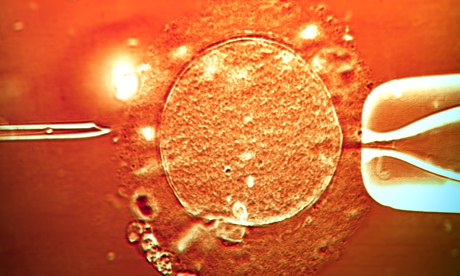
'The thing about science is that you can't predict what will happen next," says Professor Robert Winston. This may well be true, but there's no harm in trying, especially when advances may affect you personally. Will IVF treatment make a long-overdue breakthrough? Will ovarian cancer screening or an effective treatment for dementia become a reality? And would you want to have all surgery via your mouth or anus, or an infusion of fresh faeces to cure diarrhoea? Based on some major advances in 2013, here are my predictions of health stories that may change our lives in 2014.
IVF success rates to improve after 20 years of stagnation
IVF hasn't really advanced in the
past 20 years, according to Winston. But a new technique that takes thousands of pictures of developing embryos may finally improve the success rate of IVF. Time-lapse imaging can sort out healthy embryos from ones with abnormalities that are unlikely to result in a successful pregnancy. At the moment the standard technique involves embryos being taken out of the incubator once a day to be examined under the microscope. The time lapse method means the embryos don't have to leave the incubator and are imaged every 10-20 minutes. Numbers tested in 2013 were small – just 46 embryos were followed through to birth – but time-lapse imaging enthusiasts are confident that this technique will change IVF success rates for ever.
Better screening for ovarian cancer
Ovarian cancer kills 4,300 women a year in the UK. Treatment is better than it was, but the five-year survival rate for those with the advanced stage of the disease is still only 40%. The holy grail remains finding an effective screening programme to allow diagnosis at an early stage, before symptoms develop. A large American study in 2011 actually found no overall benefit of screening. But the UK Collaborative Trial of Ovarian Cancer Screening (UKCTOCS), which is due to report its findings in 2014, may yield more positive results. It was a massive study, recruiting 202,000 women and using a risk algorithm as well as a tumour marker in the blood (CA125) and ultrasound of the ovaries. Professor Ian Jacobs, principal investigator of UKCTOCS, says it's likely that screening will allow cancers to be detected up to two years earlier than they are presently. The hope is that early detection will save lives.
New insights into dementia
The number of people with dementia is steadily increasing: one in six people over 80 has some form of it. But there's no really effective treatment. "The drugs available at the moment can hold cognitive function, but they don't modify the disease," says neurologist Professor Giovanna Mallucci, programme leader at the Medical Research Council's toxicology unit. The race is on to find a way of preventing brain cell death in neurodegenerative diseases such as Alzheimer's and Parkinson's. Mallucci's team have found a major pathway leading to brain cell death in mice, and used an oral compound to block it. The treatment stopped the disease in its tracks, restored some normal behaviours and prevented memory loss in the mice. "What's so exciting is that it's a new avenue, a paradigm shift," says Mallucci. But she cautions that there are challenges to overcome. The compound causes pancreatic damage and even if a drug is developed, it will still need to go through clinical trials.
Open-access surgery
Fancy having your gallbladder removed through your mouth? An ovary could be fished out the same way. The idea is that every part of the body can be accessed through a natural orifice, such as the anus, vagina or urethra. Natural Orifice Translumenal Endoscopic Surgery (or Notes) tries to reach the parts that surgeons now access by cutting through skin, in a less invasive manner that may improve patient outcomes. At the moment, prostate surgery is done via the urethra and most operations on the uterus through the vagina. Although most research has been done on pigs, human trials are already under way.
Ninja polymers to fight athlete's foot
In an attempt to conquer antibiotic drug-resistant bacteria like MRSA, researchers at IBM have developed tiny nano molecules that penetrate the outer wall of bacteria and fungi and then kill them. When the polymers are in the body or in contact with water, they self-assemble into a new structure that is attracted to infected cells like a magnet. They attack these infected cells by piercing their walls. Once the job is done, they biodegrade so there is no toxic build up in the body. These so-called ninja particles are made from recycled plastic water bottles and can fight a range of fungi from life-threatening diseases to athlete's foot and eye infections associated with contact lenses – it has already been used to treat fungal eye infections in lab mice.
Faecal transplants
How would you feel about having someone else's liquidised faeces infused into your gut? Fecal microbiota transplantation (FMT) can help cure diarrhoea caused by antibiotics because it is a rich broth of biologically active living organisms. The disruption of normal gut bacteria may be the underlying cause of a range of bowel problems such as colitis and even non-gut-related disorders such as liver disease, depression and obesity. The only long-term study so far, including five medical centres and 77 patients who had FMT (who had had symptoms an average of 11 months) found a 91% primary cure rate, 74% within three days. Faeces is one of our great untapped natural resources.

